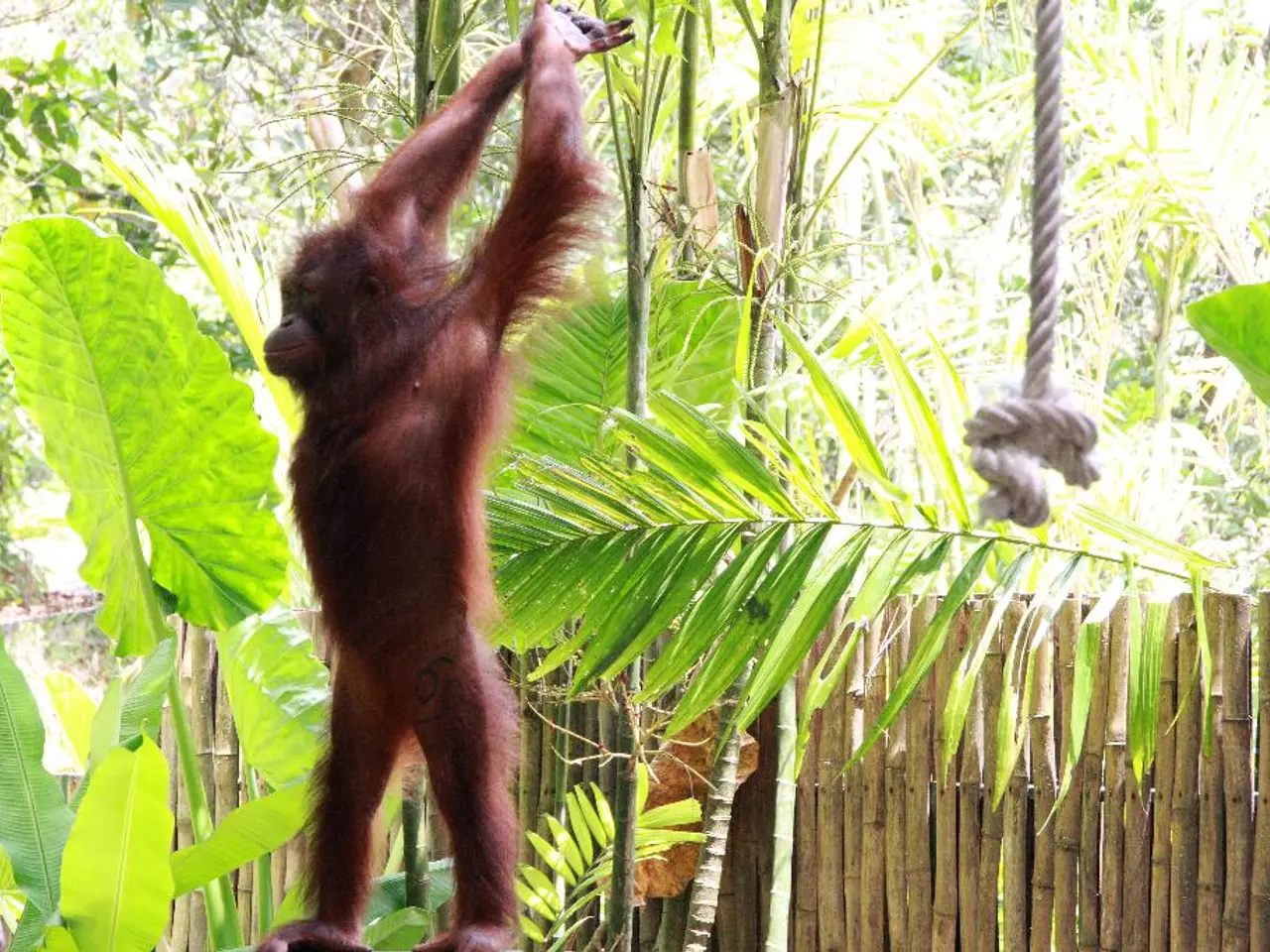Orangutan Conservation - From Morning Meals to lengths of Voyages - Orangutan Conservation: Breakfast, Transport, and Beyond
In the heart of Europe, many everyday products in Germany contain palm oil, a commodity that has been linked to deforestation and habitat loss for endangered species, particularly the Orangutans of Southeast Asia. However, there are steps consumers can take to make a difference.
One such action is choosing sustainably produced palm oil with the RSPO seal. This choice can help ease the pressure on Orangutan habitats, which are being threatened by palm oil plantations, paper production, and rare earth mining.
But the story doesn't end with palm oil. The demand for this commodity has driven deforestation, habitat loss, and biodiversity decline. To combat this, sustainable alternatives are emerging. These alternatives, such as microbial oils, algae oil, lab-grown yeast oils, and High Oleic Palm Oil (HOPO), can reduce deforestation and habitat destruction.
Microbial oils, produced through fermentation using waste materials, can mimic the fatty acid profile of palm oil, making them suitable for food, cosmetics, and biofuels. Algae oil, cultivated in controlled environments, offers a low carbon footprint with minimal water use and can be optimized to resemble palm oil composition.
A yeast-based oil, developed through directed evolution, shows promise as an eco-friendly palm oil alternative. This yeast naturally contains around 20% fat, with potential to increase yields through biotechnology, and its production does not require rainforest land, thus preventing deforestation that destroys Orangutan habitat.
High Oleic Palm Oil (HOPO) is a hybrid palm oil with higher oil yield and requires significantly less land than other oil crops. It is produced without recent deforestation and supports regenerative farming, thereby protecting ecosystems important for Orangutans. Lab-grown oils, made using artificial intelligence and yeast libraries, promise lower carbon footprints and no land clearance, preventing habitat loss for species like Orangutans.
By replacing conventional palm oil with these alternatives, consumers can contribute to the conservation of Orangutans and other endangered species. Reducing the need to clear tropical rainforest for palm plantations directly contributes to protecting Orangutans' natural environment and lowering greenhouse gas emissions.
In addition to choosing sustainable palm oil alternatives, there are other actions individuals can take. Cooking fresh instead of consuming frozen pizza can help avoid hidden palm oil sources and reduce packaging waste. Leaving the car at home and using a bike or public transport can protect twice: less palm oil consumption and fewer CO2 emissions.
August 19th is World Orangutan Day, a day to raise awareness about the plight of these magnificent creatures and the importance of conservation efforts. Orangutans live only in the wild on Borneo and Sumatra and are losing their habitat due to palm oil plantations, paper, and rare earths.
Organisations like BOS are working to combat this, launching projects like the "Forest Flyer" project. This project converts palm oil plantations into rainforest, binding CO2 and creating habitat for many species. The environmental and species protection contribution of a forest flyer is based on the CO2 emissions caused by the flight.
It's important to remember that sharing or liking content featuring Orangutans held by influencers or in tourist attractions can inadvertently fuel illegal trade. Instead, report such content directly to the platform. Organisations like BOS document abuse and work for the rescue of the animals.
In Thailand and Cambodia, shows with "boxing" or "showgirl" dressed Orangutans are often offered. Such tourist attractions should be avoided at all costs. In Indonesia and Malaysia, there are opportunities to observe Orangutans in the wild, but few providers work in a species-appropriate manner. Serious tours follow strict guidelines: no direct contact, clear spatial separation, limited visitor numbers, and a portion of the income goes to protection projects and local communities.
By making conscious choices and taking action, we can all play a part in protecting Orangutans and preserving their habitats. Let's make a difference, one choice at a time.
- The environmental science of climate change highlights the importance of sustainable choices, such as choosing sustainably produced palm oil with the RSPO seal.
- The demand for palm oil contributes to deforestation, habitat loss, and biodiversity decline, but sustainable alternatives like microbial oils, algae oil, lab-grown yeast oils, High Oleic Palm Oil (HOPO), and others are emerging as eco-friendly alternatives.
- Microbial oils, algae oil, and lab-grown yeast oils can replicate the fatty acid profile of palm oil, while High Oleic Palm Oil (HOPO) requires less land and supports regenerative farming.
- By replacing conventional palm oil with these alternatives, consumers can contribute to the conservation of Orangutans and other endangered species, as well as reducing greenhouse gas emissions.
- Cooking fresh food instead of consuming frozen meals can help avoid hidden sources of palm oil and reduce packaging waste.
- On August 19th, World Orangutan Day, individuals can raise awareness about the plight of these species and conservation efforts by sharing information and supporting organizations like BOS.
- In the pursuit of sustainable living, avoiding tourist attractions that exploit Orangutans, such as those offering boxing or showgirl shows in Thailand and Cambodia, is essential.
- Serious tours in Indonesia and Malaysia, which follow strict guidelines and support local communities and protection projects, offer opportunities to observe Orangutans in the wild in a species-appropriate manner.




